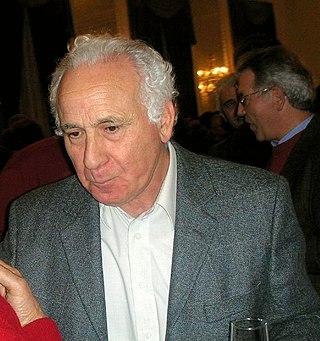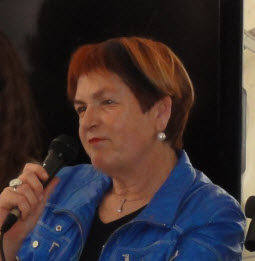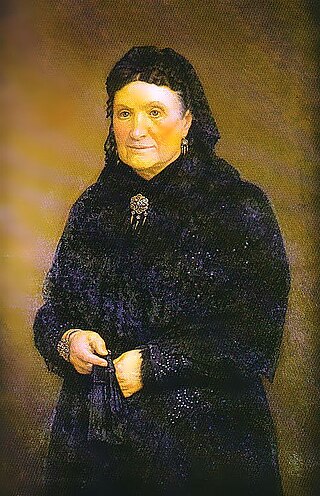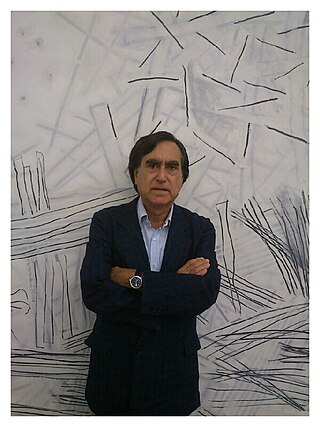
The Basque Nationalist Party, officially Basque National Party in English, is a Basque nationalist and regionalist political party. The party is located in the centre of the political spectrum.
Arraia-Maeztu, is a municipality located in the province of Álava, in the Basque Country, northern Spain.

Aurelio Arteta Errasti was a Spanish painter who worked in several styles, including Symbolism, Cubism and Social Realism. He is remembered mostly for his murals.

Resurrección María de Azkue was an influential Basque priest, musician, poet, writer, sailor and academic. He made several major contributions to the study of the Basque language and was the first head of the Euskaltzaindia, the Academy of the Basque Language. In spite of some justifiable criticism of an imbalance towards unusual and archaic forms and a tendency to ignore the Romance influence on Basque, he is considered one of the greatest scholars of Basque to date.

José Luis Álvarez Enparantza, better known by his pseudonym Txillardegi, was a Basque linguist, politician, and writer. He was born and raised in the Basque Country, and although he did not learn the Basque language until the age of 17, he later came to be considered one of the most influential figures in Basque nationalism and culture in the second half of the 20th century. He was one of the founders of ETA, but in 1967 he left because he did not agree with its political line.
Juan Manuel Bilbao Azkarreta, also known as Jon Bilbao or Jon Bilbao Azkarreta was a university instructor, a bibliographer, and an activist for Basque nationalism. He compiled the bibliographic section of the Enciclopedia general ilustrada del País Vasco (1970), and the monumental Eusko-bibliographia: diccionario de bibliografía vasca, which has been described as "one of the most significant reference works on Basque studies".

José María Sánchez Carrión is a Spanish linguist, specialised in Basque language, sociolinguistics and historical linguistics. He is an associate member of Euskaltzaindia since 1983. Despite being arguably the best known local academic proponent of reversing language shift measures, he has never held a stable university post in the Basque Country.
Elías Amézaga (1921–2008) was a Spanish writer. He was born in Bilbao on 9 August 1921 and died in Guecho on 13 April 2008.

Joxe Azurmendi Otaegi is a Basque writer, philosopher, essayist and poet. He has published numerous articles and books on ethics, politics, the philosophy of language, technique, Basque literature and philosophy in general.

Julio de Urquijo e Ibarra, Count of Urquijo (1871-1950), in Basque self-styled as Julio Urkixokoa, was a Basque linguist, cultural activist, and a Spanish Carlist politician. As a Traditionalist deputy he twice served in the Cortes, during the terms of 1903-1905 and 1931-1933, though the climax of his political activity fell on the late Restoration period. As a scientist he was the moving spirit behind setting up numerous vascologist institutions, especially Revista Internacional de Estudios Vascos (1907) and Sociedad de Estudios Vascos (1918). Himself he specialized in Basque paremiology and bibliography. He opposed academy-driven unification of Basque dialects and preferred to wait until standard Basque emerges naturally.

Mariasun Landa Etxebeste is a Spanish writer. Most of her literary production has been developed in the Basque language in the field of children's and young people's literature. She is one of the writers in Basque language more translated to other languages.

Julián Elorza Aizpuru (1879-1964) was a Spanish Carlist politician. He is best known as advocate of Basque autonomous establishments, promoted during the Restoration, the Primo de Rivera dictatorship and the Second Republic. He was member of the provincial Gipuzkoan self-government and served as its president (1919-1924). Elorza was also the founder and the first president of Sociedad de Estudios Vascos (1919-1936). Politically he refrained from Carlist militancy and remained on conciliatory terms with most other political groupings.

Joseba Agirreazkuenaga is a researcher and historian. He is specialist in the history of the Basque Country particularly: the crisis of the Ancien Régime; the fueros, self-governance, the economic concert between Spain and the Autonomous Community of the Basque Country and its fiscal system, and the social movements both in Bilbao and in the Basque Country as a whole.

Casilda Iturrizar, also known as the Epalza widow, was a Spanish philanthropist and businessperson from Bilbao in the Basque Country. Iturrizar sought to help the most disadvantaged members of Bilbao society using her fortune for charity. The street where she lived, a hospital wing, and a city park were named after her.
The Basque Studies Society is a scientific-cultural institution created in 1918 by the Provincial Councils of Álava, Vizcaya, Guipúzcoa and Navarra a stable and lasting resource to develop the Basque culture ". The members of this entity are gathered in different Scientific Sections. It is the only institution of different scientific disciplines that has official implantation in the Basque Country, Navarra and the French Basque Country, awarding, among others, the Manuel Lekuona Award. Personalities from the cultural and scientific world such as Jose Migel Barandiaran were part of its executive cadres, being a member of the Permanent Board of the Society for Basque Studies from 1921 to 1936. The headquarters are at Miramar Palace in San Sebastián, with offices and delegations in Bayona, Pamplona, Vitoria and Bilbao. This congress was chaired by Alfonso XIII of Spain and the whole body of the Navarra Provincial Council attended.

Carmen Gal Orendain, better known as Menchu Gal, was a Spanish painter from the Basque Country. Her work in landscapes and portraits made her famous with her personal attraction to vivid colors. In 1959, she became the first woman to be awarded Spain's National Painting Prize.
Tomás Bilbao Hospitalet (1890–1954) was a Basque-origin Spanish architect and politician. He was among the founders of Basque Nationalist Action. After serving as a minister of justice he exiled first to France and then, to Mexico.

Kosme de Barañano y Letamendía is a Spanish museologist and professor. He has curated and edited catalogs of more than fifty exhibitions in European and American museums. He is considered an expert in the work of Eduardo Chillida.
René Diatkine was a French psychiatrist and psychoanalyst, best remembered for his work in psychosis, and his collaborative work with Julian de Ajuriaguerra in Geneva, Jacques Lacan at the Paris Psychoanalytic Society, and Sacha Nacht. He was the chairman of the Paris Psychoanalytic Society from 1972 to 1973.
Pedro de Astigarraga Amezaga was a Spanish doctor and footballer who played as a forward for RCD Espanyol and Athletic Bilbao. He later served as the 6th president of the latter club between 1910 and 1911, and again between 1917 and 1919.











